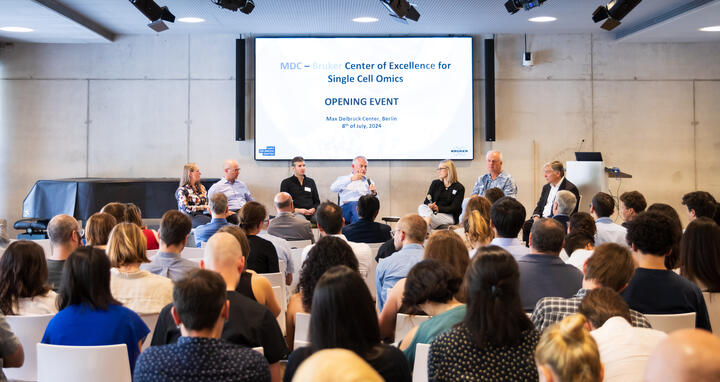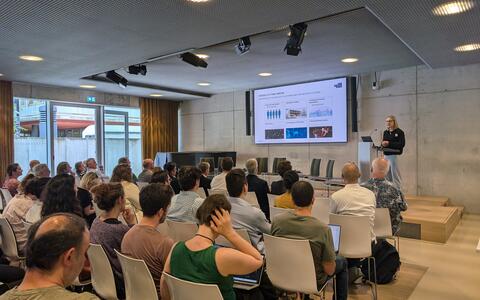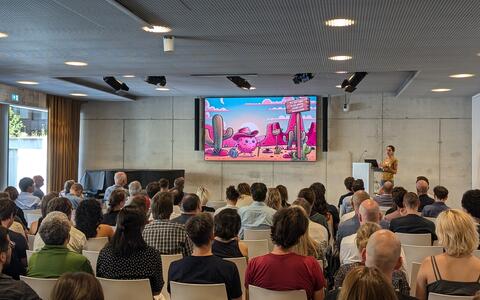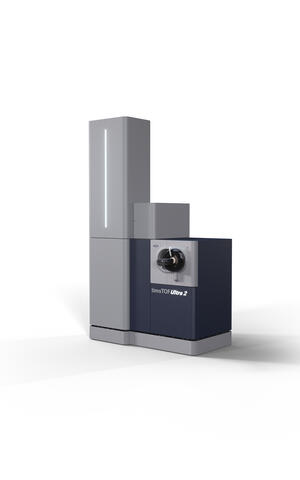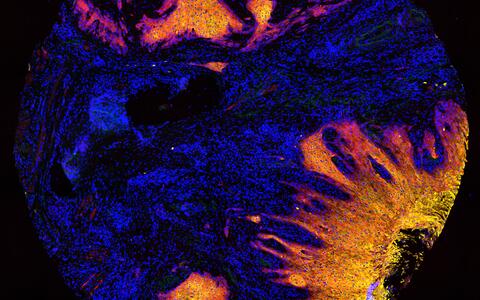New center of excellence for single cell omics
The Max Delbrück Center and Bruker have launched a strategic collaboration that aims to capitalize on the expertise of both partners to accelerate innovations in systems medicine. The partnership will allow Max Delbrück Center scientists and Bruker to work side-by-side on co-creating tools and solutions for precision medicine.
The new “MDC-Bruker Center of Excellence for Single Cell Omics” will be located at the Berlin Institute for Medical Systems Biology of the Max Delbrück Center (MDC-BIMSB) in Berlin-Mitte. The “industry-on-campus” approach will provide scientists at the Max Delbrück Center easy access to the latest mass spectrometry technologies, as well as Bruker’s expertise in single-cell and spatial proteomics. At the same time, Bruker will gain valuable opportunities for clinical applications based on close collaborations with the Max Delbrück Center and its research partners, such as the Charité – Universitätsmedizin Berlin, including within the Einstein Center for Early Disease Interception.
The opening event on July 8 will include a symposium featuring two world-renowned keynote speakers: Professor Matthias Mann, Director of the Max Planck Institute of Biochemistry and a pioneer in mass spectrometry-based proteomics, and Professor Amos Tanay from the Weizmann Institute of Science, who is trailblazing the combination of single-cell work and analysis of massive electronic health records.
Complementary technologies
Bruker’s timsTOF Ultra system
The Max Delbrück Center has developed innovative single-cell sequencing and spatial technologies that enable scientists to map cells within tissues in 2D and 3D. Additionally, it has established single-cell and spatial proteomics platforms broadly applicable to patient archival samples in various disease contexts. However, understanding health and disease requires the ability to analyze biological information at the genomic, transcriptomic, proteomic and metabolomic level. But so far, most existing methods focus on a single modality.
The proteomic technologies were developed based on Bruker’s timsTOF Ultra system – a highly sensitive mass spectrometer capable of profiling proteins from single cells from cell culture and archived tissue. While this technology provides unprecedented insight into cell-to-cell proteome heterogeneity, it doesn’t provide transcriptomic or metabolomic information, nor does it reveal the dynamics of cellular processes.
Scientific and economic connectivity
The metabolism of a cell changes rapidly in response to the environment. To monitor these changes, for example in cancer cells during therapy, scientists need to analyze them quickly – a process that is very difficult to do by hand. This microfluidic system built by the Technology Platform of Dr. Stefan Kempa at the Max Delbrück Center, enables scientists to automate the culturing and treatment of cancer cells to study their metabolism by mass spectrometry.
Now, the Max Delbrück Center and Bruker plan to expand their cooperation. Their first joint R&D project will create a broadly applicable platform to simultaneously profile proteins and metabolites, as well as lipids to understand disease processes at the level of single or a few cells. Ultimately, the aim is to develop a multi-omics workflow that could be applied in diverse clinical settings. The co-creation project totaling €1.2 million is supported by the Helmholtz Association in the framework of its Transfer campaign. Bruker is co-financing 20 %.
Collaboration between the two partners could lead to a long-term partnership and new joint R&D projects that include external partners to explore new applications of the co-developed single-cell multi-omics platform.
“Projects like this one – and the Center of Excellence as a whole – align perfectly with our strategic goal to adapt emerging technologies for medical innovation,” says Professor Maike Sander, Scientific Director of the Max Delbrück Center. “Our ‘industry-on-campus’ model with Bruker aims to sustainably develop an innovation ecosystem that attracts international talent. Academic and industry partners are already interested in collaborating.”
Dr. Severin Fischer, State Secretary in the Berlin Senate Department for Economics, Energy and Public Enterprises, says: “When science and industry work together, the whole of Berlin wins. We specifically support this and want to develop our city into the number one innovation location in Europe. The pioneering cooperation between the Max Delbrück Center and Bruker is a further step in this direction and shows how we can leverage our great potential for medical progress and economic strength.”
A vibrant environment for biomedical research
A vivid image of cancer cells invading healthy tissue, like an inferno. Such detailed visualization by immunofluorescence microscopy can help unravel how cancer cells interact with the surrounding microenvironment and contribute to treatment resistance.
Tissue stained with multiple AlexaTM fluorophore conjugated primary antibodies in several cycles and image captured using an Axioscan 7 Slidescanner.
“We are very excited to be working with the world-class researchers in proteomics, metabolomics as well as genomics and transcriptomics at the Max Delbrück Center to realize our joint vision of using a multi-omics approach to understanding biology and disease at the single-cell level,” says Dr. Rohan Thakur, President of the Life Science Mass Spectrometry business at Bruker Switzerland AG. “We are also pleased to be making this investment to increase our presence in Berlin, where initiatives supported by the Berlin Senate like the Einstein Center for Early Disease Interception are creating a vibrant and collaborative environment for biomedical research.”
“This unique partnership with Bruker allows us to jointly develop solutions for cell-based interceptive medicine,“ says Professor Nikolaus Rajewsky, Scientific Director of the MDC-BIMSB and co-spokesperson of the Einstein Center. “Our society is aging and chronic and severe diseases such as cancer, neurodegeneration and cardio-vascular diseases are on the rise. To tackle these grand medical challenges, strong interdisciplinary teams of scientists from academia and industry are essential.”
“Through innovations in ultrasensitive mass spectrometry, the proteomics research field has made a significant leap forward in recent years to measure single-cell proteomes at unprecedented biological resolution,” says Dr. Fabian Coscia, head of the Spatial Proteomics Group at the Max Delbrück Center and member of the MDC-Bruker core team. “This is an excellent foundation for our planned activities to further develop this technology for multi-omics approaches and to gain deeper insights into health and disease states.”
Further information
- Opening event
- Profile on Fabian Coscia
- Spatial Proteomics Lab
- Stefan Kempa, head of Proteomics & Metabolomics technology platform
- 3D maps of diseased tissues at subcellular precision
- Profile on Nikolaus Rajewsky
- Systems Biology of Gene Regulatory Elements Lab
- Profile on Matthias Selbach
- Proteome Dynamics Lab
- Einstein Center for Early Disease Interception
- Bruker
Pictures for download
- The new “Center of Excellence for Single Cell Omics" will be located at MDC-BIMSB in Berlin-Mitte. Photo: David Ausserhofer, Max Delbrück Center
- Cancer cells invading healthy tissue: detailed visualization by immunofluorescence microscopy helps to select the most disease-relevant cells for proteomic analysis. Photo: Coscia Lab, Max Delbrück Center
- The metabolism of a cell changes rapidly in response to the environment. To monitor these changes, for example in cancer cells during therapy, scientists need to analyze them quickly – a process that is very difficult to do by hand. This microfluidic system built by the Technology Platform of Dr. Stefan Kempa at the Max Delbrück Center, enables scientists to automate the culturing and treatment of cancer cells to study their metabolism by mass spectrometry. Photo: Dr. Martin Forbes, Proteomics & Metabolomics Platform, Max Delbrück Center.
- Before proteome analysis, the highly sensitive mass spectrometers must be calibrated. Photo: Felix Petermann, Max Delbrück Center
- Bruker’s timsTOF Ultra system. Photo: Bruker
Contacts
Marie Vidal
Industry and Innovation manager
Berlin Institute for Medical Systems Biology of the Max Delbrück Center (MDC-BIMSB)
+49 30 9406-3301
marie.vidal@mdc-berlin.de
Jutta Kramm
Head of Communications
Max Delbrück Center
+49 30 9406-2140
jutta.kramm@mdc-berlin.de or presse@mdc-berlin.de
Petra Scheffer
Marketing Communications
Bruker Daltonics
+49 421 2205-2843
petra.scheffer@bruker.com
- Bruker Corporation
Bruker is enabling scientists and engineers to make breakthrough post-genomic discoveries and develop new applications that improve the quality of human life. Bruker’s high-performance scientific instruments and high-value analytical and diagnostic solutions enable scientists to explore life and materials at molecular, cellular, and microscopic levels. In close cooperation with our customers, Bruker is enabling innovation, improved productivity, and customer success in post-genomic life science molecular and cell biology research, in applied and biopharma applications, in microscopy and nano analysis, as well as in industrial and cleantech research, and next-gen semiconductor metrology in support of AI. Bruker offers differentiated, high-value life science and diagnostics systems and solutions in preclinical imaging, clinical phenomics research, proteomics and multiomics, spatial and single-cell biology, functional structural and condensate biology, as well as in clinical microbiology and molecular diagnostics.
- Max Delbrück Center
-
The Max Delbrück Center for Molecular Medicine in the Helmholtz Association (Max Delbrück Center) is one of the world’s leading biomedical research institutions. Max Delbrück, a Berlin native, was a Nobel laureate and one of the founders of molecular biology. At the locations in Berlin-Buch and Mitte, researchers from some 70 countries study human biology – investigating the foundations of life from its most elementary building blocks to systems-wide mechanisms. By understanding what regulates or disrupts the dynamic equilibrium of a cell, an organ, or the entire body, we can prevent diseases, diagnose them earlier, and stop their progression with tailored therapies. Patients should be able to benefit as soon as possible from basic research discoveries. This is why the Max Delbrück Center supports spin-off creation and participates in collaborative networks. It works in close partnership with Charité – Universitätsmedizin Berlin in the jointly-run Experimental and Clinical Research Center (ECRC), the Berlin Institute of Health (BIH) at Charité, and the German Center for Cardiovascular Research (DZHK). Founded in 1992, the Max Delbrück Center today employs 1,800 people and is 90 percent funded by the German federal government and 10 percent by the State of Berlin.

